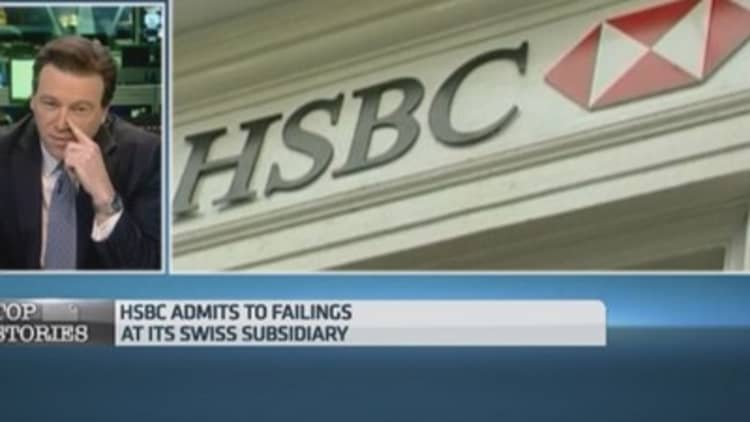The controversy surrounding HSBC's Swiss private banking division is the latest in the line of scandals that have rocked the U.K. financial industry, with criminal and regulatory investigations now a "way of life," for banks, ratings agency Standard & Poor's (S&P) said on Wednesday.
Misconduct risks have become a much bigger issue… Investigations have become a way of life," said Nigel Greenwood, S&P credit analyst, in a news briefing in London.
HSBC Holdings is listed on the FTSE 100 and has a market capitalization of around £112 billion ($171 billion). A panel of British lawmakers said this week that the bank would be investigated over allegations that its Swiss arm helped wealthy customers dodge taxes and conceal millions of dollars in assets.
Opposition politicians are demanding a response from former HSBC Executive Chairman Stephen Green, an ordained clergyman who was elected trade minister in 2010.
The bank may also face charges in France, Belgium, the U.S. and Argentina.
The HSBC allegations are the latest in a stream that has flooded the British banking sector since the global financial crisis of 2007/08.
Read More
"There are still plenty of past misdemeanors that will continue to work their way through bank earnings," said Greenwood on Wednesday.

These include the scandal surrounding the fixing of key bank rate Libor in 2012, which saw Barclays Chief Executive Bob Diamond forced to resign. HSBC has also been fined for conspiring to manipulate foreign exchange rates and for misselling interest-rate hedging products.
Major Swiss banks like UBS have also been accused of helping wealthy clients shield their assets from taxation.
Read MoreUBS warns on Swiss franc strength, doubles dividend
In response to heightened concerns about "misconduct risks," banks have moved to make ethical and discipline issues more central to their business, with compliance officers increasingly reporting directly to chief executives.
"Most banks are now focused upon further changes to their business model, with a greater focus upon culture, compliance, sales practices and digital efficiencies compared to the past," S&P said in a report accompanying Wednesday's briefing.
Despite these efforts, and the improving economic climate, Greenwood said that U.K. banking still did not "stack up that great" when compared with the rest of Europe.
S&P rated the banking sectors in Scandinavia, the Germanic countries and even France higher than the U.K. in terms of industry and economic risks.
Greenwood said S&P starting point or "anchor" rating for U.K. banks was BBB+ — just a few notches above "junk" grade.
Prior to the financial crisis, most large U.K. banks were rated around AA.
Read More

